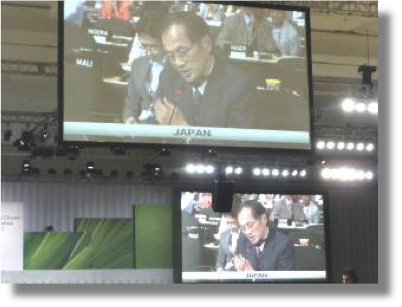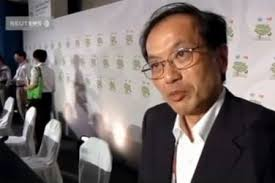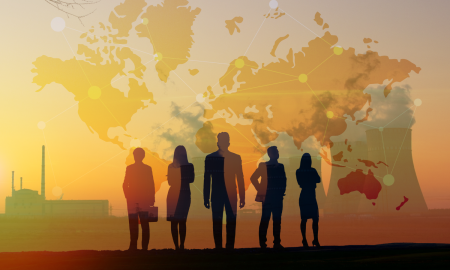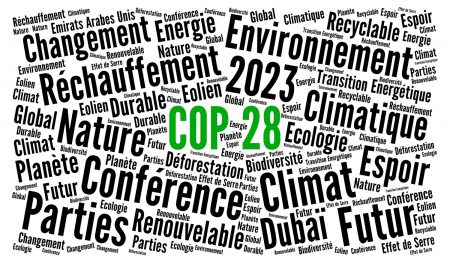私的京都議定書始末記(その38)
-初日のステートメントとその波紋-
有馬 純
国際環境経済研究所主席研究員、東京大学公共政策大学院特任教授
初日のステートメント
今、私の目の前にAWG-KP初日行ったステートメントの原稿がある。ここにその全文を掲載したい。
Thank you, Mr.Chairman,
We are tackling global warming issues. Global issues need global solution. We should recognize that we are not living in the year 1997. When the Kyoto Protocol was crafted in 1997, it was supposed to cover 56% of global CO2 emissions under obligation. However, due to the withdrawal of the US from the Kyoto Protocol and rapid increase of the GHG emissions in emerging economies, its coverage of emissions under obligation is merely 27% and will further decline in the coming years. Under such radical change of circumstances, it is obvious that setting caps on a small part of global emissions under the Kyoto Protocol can never be effective vehicle in tackling global warming in coming years, while acknowledging its historical role.
On the other hand, the countries which have associated with the Copenhagen Accord cover 85% of the global CO2 emissions. It is obvious that the Copenhagen Accord is the point of departure towards truly effective global framework.

That is why Japan is aiming at an early adoption of a new single legally binding instrument constituting a fair and effective international framework with the participation of all major emitters based on the Copenhagen Accord.
Unfortunately, it is not likely that we could adopt such a single legally binding document at Cancun. Therefore, Japan is aiming at a balanced COP decision package covering all major elements respecting a delicate balance in the Copenhagen Accord. Cancun should present a milestone towards the ultimate goal. We strongly expect that the negotiation at the AWG-LCA would make a tangible progress to this end.
Mr.Chairman,
Japan has been participating in the AWG-KP with an expectation that some elements such as the rules for LULUCF, baskets and market mechanisms could provide useful components to a broader outcome. In this respect, there has been some progress in these areas. Further progress on these issues would certainly provide useful inputs to the packaged outcome here in Cancun and we will actively contribute to this end.
On the other hand, we should recognize that so-called “number” issue is in a complete stalemate. This is not surprising since the number issue is only a part of broad picture. Almost all the pledges by the Annex I Parties under the Copenhagen Accord are premised to the establishment of a fair and effective global deal engaging all major emitters including the US and major developing countries. This means that global mitigation efforts by both developed countries and developing countries can only be addressed in the AWG-LCA.
Mr.Chairman,
Today, we have heard many statements from developing country partners calling for cementing the 2nd commitment period of the Kyoto Protocol. Japan reiterates its firm position that our 2020 target has been pledged under the Copenhagen Accord. Japan is not in a position to inscribe our target in the Annex B of the Kyoto Protocol under any condition or circumstances. This is because Japan is aiming at a truly effective global deal. Kyoto 2nd commitment period will never constitute a fair and effective single framework with the participation of all major emitters, which we are aiming at.
There is an argument that we should keep all the options open, not prejudging any legal outcome of the on-going negotiation. It is understandable approach under the current non-convergence on this issue. For this very reason, we will never accept any CMP decision implying the setting of the 2nd commitment period or provisional extension of the 1st commitment period since this itself will prejudge the legal outcome.
Mr.Chairman,
Japan also reiterates its determination to achieve 6% reduction target under the Kyoto 1st commitment period. Moreover, as our own initiative, Japan will further enhance its mitigation efforts through green innovation aiming at the “world’s top environment and energy power”.
Japan is also determined to take a lead in assisting developing countries. Japan committed 15 billion dollars of fast-start financing to developing countries in 3 years and has already delivered 7.2 billion dollars as of the end of September. Japan supports establishment of the Copenhagen Green Fund and is willing to participate in the preparatory work to this end, which is premised to the progress on mitigation actions and MRV by developing countries. Japan is also willing to make an appropriate contribution to the long-term finance beyond 2013 premised to ensuring necessary financial sources and in accordance with other countries’ preparedness.
In addition, Japan intends to promote bilateral and regional cooperative activities engaging private sector with a view to supporting mitigation actions and MRV by developing countries.
Mr.Chairman,
My intervention has covered much broader perspective compared with the mandate of the AWG-KP. However, it should be born in mind that this comprehensive scope, namely, mitigation by both developed and developing countries and financial and technical support to developing countries is the key for a successful outcome of the on-going negotiation. Discussion solely focusing on the 2nd commitment period will not to anywhere.
Japan strongly hope that the whole negotiation in Cancun will make a good and balanced progress towards a fair and effective international framework engaging all major emitters.
Thank you.
私のこのステートメントのうち、Japan is not in a position to inscribe our target in the Annex B of the Kyoto Protocol under any condition or circumstances のくだりが、その後、NHKその他のニュースで何度も放映された。あたかも私がそれしか言わなかったように映ったかもしれないが、日本が全ての国が参加する枠組みを重視していること、途上国支援においてもイニシアティブをとっていること、日本としては前向きに交渉に貢献するつもりであること等、もっと広範なテーマに触れていたつもりである。だからこそ狭いアジェンダのみに拘泥するAWG-KPで言う必要があったのだ。
発言を終えると議場に沈黙が流れた。これまでの発言、特に途上国代表の発言についてはその都度、拍手がわいていたのとは対照的である。拍手など、はなから期待していなかったし、25%目標を発表して拍手を受けたときよりも余程気分は良かった。タバコを吸いに議場の外に出ようとしたところ、ニュージーランドのジョー・ティンダール大使から小声で呼び止められ、「You are brave!」と言われた。
AWG-KPプレナリーは、いつものように先進各国・先進国全体の削減幅(ナンバー)、LULUCF、温室効果ガスの範囲等、メカニズム、対応措置の5つのグループに分かれて議論することを決めて散会した。会場を出しなに、顔見知りの日本の環境NGOの人から「説得力のあるステートメントでしたね」と言われた。環境NGOの方から褒めていただくことは余りないので、「有難うございます」とお礼を言って別れた。しかし翌日からが大変だった。
ステートメントへの反応
一夜明けて代表団内会議に出ると、各国代表団に幅広いネットワークを有する環境省の島田交渉官から、「昨日の日本のステートメントが大変な話題になっている」という報告があった。良い意味で話題になっているのではないのは言うまでもない。
私が発言した内容は、これまでAWGやMEF、メキシコ非公式協議等で日本が表明してきたポジションと変わるものではない。あえて違いを言えば「いかなる状況の下でも」という強い表現を入れたことである。中国等の途上国は「EUは第二約束期間容認に舵を切った。日本は第二約束期間を受け入れないと言っているが、COPの場で数で押せばAWG-LCAでそこそこの成果が出ることを条件に最後は受け入るだろう」くらいに考えていたのかもしれない。だからこそ初日に日本が率直過ぎるくらい率直に、妥協できないレッドラインを示したことに驚き、かつ反発したのだろう。
案の定、11月30日に環境NGOが発表する「化石大賞」は2位、3位なしで日本が「ぶっちぎりの1位」を獲得した。初日のステートメントの後、日本の環境NGOからお褒めにあずかったのだが、国際NGOの集まりの中で、日本は集中攻撃を受けたようだ。ちなみに米国が京都議定書から離脱した際は Fossil of the Day ならぬ Fossil of the Century を受賞しているし、後に日本がワルシャワのCOP19で90年比25%削減目標を取り下げ、2005年比3.8%減目標を表明した際は「特別化石賞」を受賞した。「ぶっちぎりの1位」くらいで驚いてはいけないのかもしれない。
11月30日には内外記者会見も行われ、環境省の南川次官を筆頭に壇上に並んでプレスの質問を受けた。「日本は京都議定書から離脱するのか」「京都議定書第二約束期間を拒絶することで交渉全体をブロックすることになるのではないか」等、ほとんどの質問が京都議定書問題に集中した。南川次官、外務省の山田参事官から「会議冒頭であったこと、曖昧さを廃した率直なものであったため、ショックだったかもしれないが、日本のステートメントで示されたポジションは何ら新たなものではなく、前からよく知られていたもの。京都議定書第二約束期間は全ての国が参加する実効ある枠組みを作る上で実効性がない。これは日本の利害で言っているのではなく、地球を守る観点からも有効ではないということだ。日本は京都議定書から離脱するつもりはなく、第一約束期間の約束は誠実に守る。また全ての国が参加する公平で実効ある枠組みに向けて貢献していく。」と答えていた。私も壇上で質問に答え、日本の立場を説明すると共に、記者会見後、ガーディアン紙の記者からインタビューも受けた。

悪名世界に広がる
日本のステートメントはプレスでも大きく取り上げられ、インターネットで Japan, Kyoto Protocol, COP16 というキーワードを入れるとずらりと記事が出てきた。英語のみならず、デンマーク語、スペイン語等、様々であり、その多くに私の名前も言及されていた。12月にはいっていたこともあり、12月8日のパールハーバーになぞらえた記事すらあった。ガーディアン紙は12月1日付の記事で以下のように報じている。
The brief statement, made by Jun Arima, an official in the government’s economics trade and industry department, in an open session, was the strongest yet made against the protocol by one of the largest emitters of greenhouse gases.
He said: “Japan will not inscribe its target under the Kyoto Protocol on any conditions or under any circumstances.”
The move came out of the blue for other delegations at the conference.
“For Japan to come out with a statement like that at the beginning of the talks is significant,” said one British official. “The forthrightness of the statement took people by surprise.”
If it proves to be a new, formal position rather than a negotiating tactic, it could provoke a walk-out by some developing countries and threaten a breakdown in the talks. Last night diplomats were urgently trying to clarify the position.
バイロンは「ある朝目覚めたら私は有名になっていた」という言葉を残しているが、「ある朝目覚めたら、私の悪名がとどろいていた」という感じであった。
もっとも少数ではあるが、日本の対応は正直だという論調もあった。12月6 日付けの英紙タイムズには”Japan try new approach-honesty-“ と題する以下の記事が出た。
The first week of the talks was dominated by a row over Japan saying it would not accept the continuation of the Kyoto Protocol. Developing countries condemned this as a betrayal and Britain disassociated itself from the Japanese position. But in reality, Japan is simply being more honest than other countries. (中略)
History may judge that Japan’s intervention was the moment when negotiators were forced to confront realities rather than distributing draft agreements full of impenetrable diplomatic language, not to mention, the odd bowler.
また私にとって心強かったのは日本の新聞各紙は概ね、第二約束期間に入らずという政府の方針を支持もしくは容認していたことだ。これまで温暖化交渉に参加して、前線で頑張っていても、「後ろから弾が飛んで来て」悔しい思いをしたことがしばしばあった。しかしカンクンに関する限り、そうした経験はほとんどなかった。カンクンに先立ってプレスブリーフィングを丹念にやっておいたことが奏功したようだ。



















